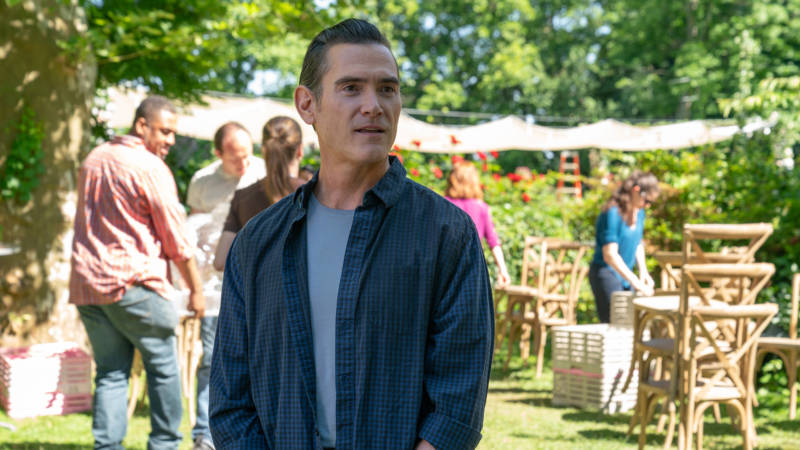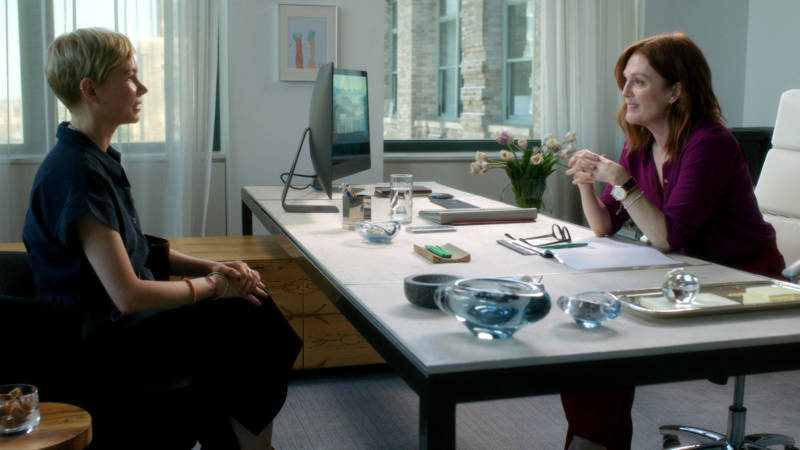Before I spoke with Bart Freundlich about his new film After the Wedding, I listened to a short review on KCRW’s Press Play. The host of the program and her guests, two film critics, summed up the movie as an opportunity for the actors—including Michelle Williams and Freundlich’s wife Julianne Moore—to emote. There was a collective eye roll implicit in their critique.
In the film, Williams’ character Isabel runs an orphanage in India. She’s on her way to New York to ask Moore’s Theresa, a media mogul, for a donation. When they meet in person, Isabel’s past sways Theresa’s decision and clues us into the movie’s tagline, “Every family has a secret.” (Freundlich’s After the Wedding is a remake of Danish filmmaker Susanne Bier’s 2006 film of the same name, swapping the lead male characters for leading ladies.)
After the Wedding opens while the number one film at the American box office is the hyper-masculine (or is it the ne plus ultra masculine?) buddy movie Hobbs & Shaw. In a cinematic ecosystem that rewards fast cars and bulging biceps, the critics on Press Play suggested audiences wouldn’t have the patience to sit through this kind of melodrama.
In a phone interview, Freundlich talked about how he handles criticism (“Earnest movies sometimes have a harder time with reviews”), why he decided to remake the original and how something beautiful can also be real.

Was there an expectation that it should have been grittier?
There might have been a feeling that the gloss of some of the film, the high profile of the actors, could take away from the deeper, more subtle meaning. Or didn’t encourage you to look as hard, or possibly that my intention was to glaze over something, as opposed to telling a story.
When, in fact, what I love about this story is that there are no heroes in the movie, and that there are no villains. There’s no judgment, that, as the filmmaker, I’m against any of these characters. It’s much more true to life, where we make decisions and then those consequences tend to play out and are pretty rough.
You make a point of showing how both Isabel and Theresa are different in public than who they are in private.
That’s something that books can do, but cinema does beautifully. It lets you see how people present themselves to the world, and then lets you see these private moments, and they don’t all have to necessarily be narrated. You get to do a lot of projection, literally, onto these characters.
I was also interested in the way in which our pasts inform the way we think the world has to work. How we assume it works, and then how that helps to form our defense mechanisms, our loves and the things that we pursue.

You bookend the film with the protagonists looking in mirrors, that trope used in film noir and classic melodramas. But you keep the camera as a medium shot. Why didn’t you go in for close-ups?
It felt reductive to me, once you saw the actual expressions. We did cover those things tight, so I wasn’t against the idea of using them. But what ended up happening, as the editor Joe Krings and I cut the movie, was those two moments, were much more about the fact that these people were perceiving themselves, Isabel and Theresa, how much they were willing to look at themselves, and look beyond the image they were seeing.
Especially with Isabel at the end, because she was willing to stand still and look at herself for the first time. She tends to look out at the rest of the world. Her introspection is through her meditation, and that’s how she explores her inner life that way, but really doesn’t want to see who she is in reality, including all the decisions she’s made in her past.

Earlier you mentioned that there was no hero, but Theresa, the millionaire media mogul, is put in the position of being an American savior. Why did you place the characters in such extreme socioeconomic positions?
My intention was certainly not to paint Theresa as the hero. I think on the outside, you could write an essay about why she is the hero, but you could also write that about Isabel and Oscar [Theresa’s husband, played by Billy Crudup].
I felt that it was an effective part of Susanne Bier’s film, to depict these two very, very disparate worlds. I certainly wasn’t intending to say anything about who is more valuable—someone who gives their time and soul to a place, or someone who just gives money. Or, who can be happier.
I know that Julianne does as well, but I view Theresa as an extremely morally and ethically compromised person. She’s doing something that’s fairly fraught and selfish. It seems that she’s doing it out of entitlement because of her place in the business world. But ultimately I think she’s just doing it out of desperation. She just happens to have the power.

This is your third film with Billy Crudup. What’s your working relationship like?
After Billy saw the first film that we made, World Traveler, I remember he came up to me right after the screening and said, “This is exactly the kind of film I want to be in.” I loved the way he said it, because it wasn’t like, “I loved it,” or “We did it,” or “That’s my best performance.” It was just like yeah, what you’re aiming for and what you’re searching for, I’m interested in being along with you on that journey, and trying to get there.

‘After the Wedding’ opens Friday, Aug. 16 at Landmark’s Embarcadero Center Cinema in San Francisco and at CinéArts at Palo Alto Square in Palo Alto.


